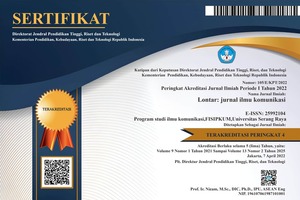Collaborative Strategies for Managing Mangrove Ecotourism: Raising Awareness and Stakeholder Participation in Sustainable Tourism
DOI:
https://doi.org/10.30656/lontar.v12.i2.8744Keywords:
Edu-Ecotourism, Stakeholder, engagement, AwarenessAbstract
The purpose of this research is to identify and develop collaborative strategies in managing mangrove ecotourism with a focus on increasing awareness and stakeholder participation in sustainable tourism. This research aims to explore ways to increase community awareness and stakeholder involvement in sustainable mangrove ecotourism management efforts.This research uses a qualitative approach with an explanatory case study method, because this research investigates and describes the complexity in the context of stakeholder involvement in the development of edu-ecotourism in Lembur Mangrove Patikang, Pandeglang. Data collection techniques used in-depth interviews, document study and observation. Data collection techniques used in-depth interviews, document study and observation. The Edu-Ecotourism Mangrove program in Patikang Mangrove Valley, run by PT Chandra Asri Petrochemical Tbk, is a sustainable initiative involving various stakeholders, including companies, governments, academic institutions, media, and local communities. The program aims to integrate education, environmental conservation, and sustainable tourism in mangrove forest preservation, building environmental awareness, increasing stakeholder participation, and empowering local communities in ecotourism management. It emphasizes economic, social, and environmental sustainability, demonstrating a commitment to holistic engagement.This study has several limitations of results due an interpretation, and limited stakeholder engagement. future research can improve the validity, reliability, and relevance of the recommendations.
References
Alqaisi, I. F. (2018). The effects of stakeholder’s engagement and communication management on projects success. MATEC Web of Conferences, 162, 02037. https://doi.org/10.1051/matecconf/201816202037
Amoako, G. K., Obuobisa-Darko, T., & Ohene Marfo, S. (2022). Stakeholder role in tourism sustainability: the case of Kwame Nkrumah Mausoleum and centre for art and culture in Ghana. International Hospitality Review, 36(1), 25–44. https://doi.org/10.1108/IHR-09-2020-0057
Antara News. (2024, June 1). Chandra Asri Resmikan Kawasan Edu-ekowisata Mangrove Patikang Lestari. Https://Banten.Antaranews.Com/Berita/223845/Chandra-Asri-Resmikan-Kawasan-Edu-Ekowisata-Mangrove-Patikang-Lestari.
Asy’Ari, R., Rahmawati, A. D., Sa’diyya, N., Gustawan, A. H., Setiawan, Y., Zamani, N. P., & Pramulya, R. (2022). Mapping mangrove forest distribution on Banten, Jakarta, and West Java Ecotone Zone from Sentinel-2-derived indices using cloud computing based Random Forest. Jurnal Pengelolaan Sumberdaya Alam Dan Lingkungan (Journal of Natural Resources and Environmental Management), 12(1), 97–111. https://doi.org/10.29244/jpsl.12.1.97-111
Baig, S. A., Abrar, M., Batool, A., Hashim, M., & Shabbir, R. (2020). Barriers to the adoption of sustainable supply chain management practices: Moderating role of firm size. Cogent Business & Management, 7(1), 1841525. https://doi.org/10.1080/23311975.2020.1841525
Gias, G., Tahapary, G., Riyantini, I., Pamungkas, W., & Taofiqurohman, A. (2023). Journal of Indonesian Tourism and Development Studies Analysis of Land Suitability for Mangrove Ecotourism in Tanjung Lesung, Banten Province. J. Ind. Tour. Dev. Std, 11(1). https://doi.org/10.21776/ub.jitode.2023.011.01.03
Golob, U., & Podnar, K. (2014). Critical points of CSR related stakeholder dialogue in practice. Business Ethics: A European Review, 23(3), 248–257. https://doi.org/10.1111/beer.12049
Gutterman, A. S. (2023). Stakeholder Engagement. https://ssrn.com/abstract=4393164
Hamimah, T., Nurul Huda, N., Uni Kamlun, K., Rosmalina, A. R., & Jennifer, C. K. L. (2022). Sustainability assessment of mangrove forest as a tourist destination: A case study using GSTC Criteria in Kota Belud, Sabah, Malaysia. IOP Conference Series: Earth and Environmental Science, 1053(1), 012028. https://doi.org/10.1088/1755-1315/1053/1/012028
Hoang, T. (2018). The Role of the Integrated Reporting in Raising Awareness of Environmental, Social and Corporate Governance (ESG) Performance (pp. 47–69). https://doi.org/10.1108/S2043-052320180000014003
Irawan, N., Hartoyo, E., Suswadi, & Mustaqim. (2022). Environmental management and stakeholder roles in sustainable tourism development: a feasibility study. IOP Conference Series: Earth and Environmental Science, 1108(1), 012068. https://doi.org/10.1088/1755-1315/1108/1/012068
Jadesta Kemenparekraf. (2024, June 1). Edukasi Tentang Pelestarian Alam Mangrove Di Ekowisata Mangrove Pandang Tak Jemu. Https://Jadesta.Kemenparekraf.Go.Id/Paket/Edukasi_tentang_pelestarian_alam__mangrove_di_ekowisata_mangrove_pandang_tak_jemu.
Jun, H., & Kim, M. (2021). From Stakeholder Communication to Engagement for the Sustainable Development Goals (SDGs): A Case Study of LG Electronics. Sustainability, 13(15), 8624. https://doi.org/10.3390/su13158624
Kriyantono, R. (2021). Baest Practice Humas (Public Relations) Bisnis Dan Pemerintah: Manajemen Humas, Teknik Produksi Media Publisitas dan Public Relations Writing. Prenada Media.
Kurniawan, M. A., Yusran, Y., & Sabar, A. (2020). Analysis of actors in the management of Lantebung mangrove ecotourism, Bira village, Tamalanrea district, Makassar city. IOP Conference Series: Earth and Environmental Science, 575(1), 012216. https://doi.org/10.1088/1755-1315/575/1/012216
Margaret K.Y Mok, & Geoffrey Q. Shen. (2017). Future Challenges in Evaluating and Managing Sustainable Development in the Built Environment (P. S. Brandon, P. Lombardi, & G. Q. Shen, Eds.). Wiley. https://doi.org/10.1002/9781119190691
Papagiannakis, G., Voudouris, I., Lioukas, S., & Kassinis, G. (2019). Environmental management systems and environmental product innovation: The role of stakeholder engagement. Business Strategy and the Environment, 28(6), 939–950. https://doi.org/10.1002/bse.2293
PraniÄević, D. G., & Peterlin, J. (2015). Communication with the stakeholders in sustainable tourism (Vol. 3). http://ssrn.com/abstract=2637259
Prayudi. (2018). STUDY ON STAKEHOLDER ENGAGEMENT AND COMMUNICATION IN DEVELOPING SUSTAINABLE TOURISM IN INDONESIA. PEOPLE: International Journal of Social Sciences, 4(3), 574–592. https://doi.org/10.20319/pijss.2018.43.574592
PT Chandra Asri Petrochemical Tbk. (2022a). Environmental, Social, and Governance (ESG) why it matters to Chandra Asri Caring for Environment Sharing Social Values Sustainability Governance.
PT Chandra Asri Petrochemical Tbk. (2022b). Establishing Resilience Through RESPONSIBLE Leadership (Sustainability Report 2022).
Raji, A., & Hassan, A. (2021). Sustainability and Stakeholder Awareness: A Case Study of a Scottish University. Sustainability, 13(8), 4186. https://doi.org/10.3390/su13084186
Rosilawati, Y., Septi Winarsih, A., Rafique, Z., & Iqbal Khatami, M. (2023). Penta Helix Model Communication to Promote Appropriate and Green Technologies for Ayung River Preservation Program in Bali. E3S Web of Conferences, 425, 04001. https://doi.org/10.1051/e3sconf/202342504001
Roxas, F. M. Y., Rivera, J. P. R., & Gutierrez, E. L. M. (2020). Mapping stakeholders’ roles in governing sustainable tourism destinations. Journal of Hospitality and Tourism Management, 45, 387–398. https://doi.org/10.1016/j.jhtm.2020.09.005
Rustam Hakim Manan. (2020). The Concept of Mangrove ECO Tourism Master Plan in Belitung District Indonesia. International Journal of Engineering Research And, V9(02). https://doi.org/10.17577/IJERTV9IS020169
Sathiyamoorthy, S., & Sakurai, T. (2024). Effectiveness of community participation in Mangrove restoration: the evidence from northern Sri Lanka. Environmental Economics and Policy Studies. https://doi.org/10.1007/s10018-024-00397-1
Seva, T. A., Purwanto, W., & Latuconsina, A. R. (2022). Ecosystem conservation of Mangrove Education Center (MEC) in handling abration disaster at Pangkalan Jambi village based on stakeholder engagement perspective. IOP Conference Series: Earth and Environmental Science, 986(1), 012019. https://doi.org/10.1088/1755-1315/986/1/012019
Susmiatun Hayati. (2022). Chandra Asri Resmikan Kawasan Edu-ekowisata Mangrove Patikang Lestari. Https://Banten.Antaranews.Com/Berita/223845/Chandra-Asri-Resmikan-Kawasan-Edu-Ekowisata-Mangrove-Patikang-Lestari.
Vluggen, R., Kuijpers, R., Semeijn, J., & Gelderman, C. J. (2020). Social return on investment in the public sector. Journal of Public Procurement, 20(3), 235–264. https://doi.org/10.1108/JOPP-06-2018-0023
Wu, X., Hashemi, S., Yao, Y., Kiumarsi, S., Liu, D., & Tang, J. (2023). How Do Tourism Stakeholders Support Sustainable Tourism Development: The Case of Iran. Sustainability (Switzerland), 15(9). https://doi.org/10.3390/su15097661
Wulan Dari, S., & Nur Fitriana, K. (2024). ANALISIS STAKEHOLDER DALAM PENCAPAIAN SUSTAINABLE DEVELOPMENT GOALS (SDGS) DI KABUPATEN SLEMAN STAKEHOLDER ANALYSIS IN ACHIEVING SUSTAINABLE DEVELOPMENT GOALS (SDGS) IN SLEMAN DISTRICT. https://journal.student.uny.ac.id/index.php/joppar
Yaeni, T., Yulianda, F., & Yulianto, G. (2022). Rehabilitation strategy for mangrove ecotourism development in Tanjung Burung, Tangerang. IOP Conference Series: Earth and Environmental Science, 967(1), 012026. https://doi.org/10.1088/1755-1315/967/1/012026
Yasir, Y., Firdaus, M., Nurjanah, N., & Salam, N. E. (2021). Environmental communication model through community-based tourism development in overcoming mangrove damage. IOP Conference Series: Earth and Environmental Science, 886(1), 012022. https://doi.org/10.1088/1755-1315/886/1/012022
Yasir, Y., Firzal, Y., Sulistyani, A., & Yesicha, C. (2021). Penta helix communication model through community based tourism (CBT) for tourism village development in Koto Sentajo, Riau, Indonesia. Geojournal of Tourism and Geosites, 37(3). https://doi.org/10.30892/GTG.37316-718
Downloads
Published
Issue
Section
License

This work is licensed under a Creative Commons Attribution-ShareAlike 4.0 International License.
By submitting an article to the journal, the author(s) agree to transfer the published article's copyright to the journal, which will act as the publisher. This means the journal will have the right to publish the article in various forms, including reprints. The journal will maintain the publishing rights to the published articles.
In line with the license, authors and third parties (readers, researchers, and others) are allowed to share and adapt the material. In addition, the material must be given appropriate credit, provided with a link to the license, and indicated if changes were made. If authors remix, transform, or build upon the material, authors must distribute their contributions under the same license as the original.





